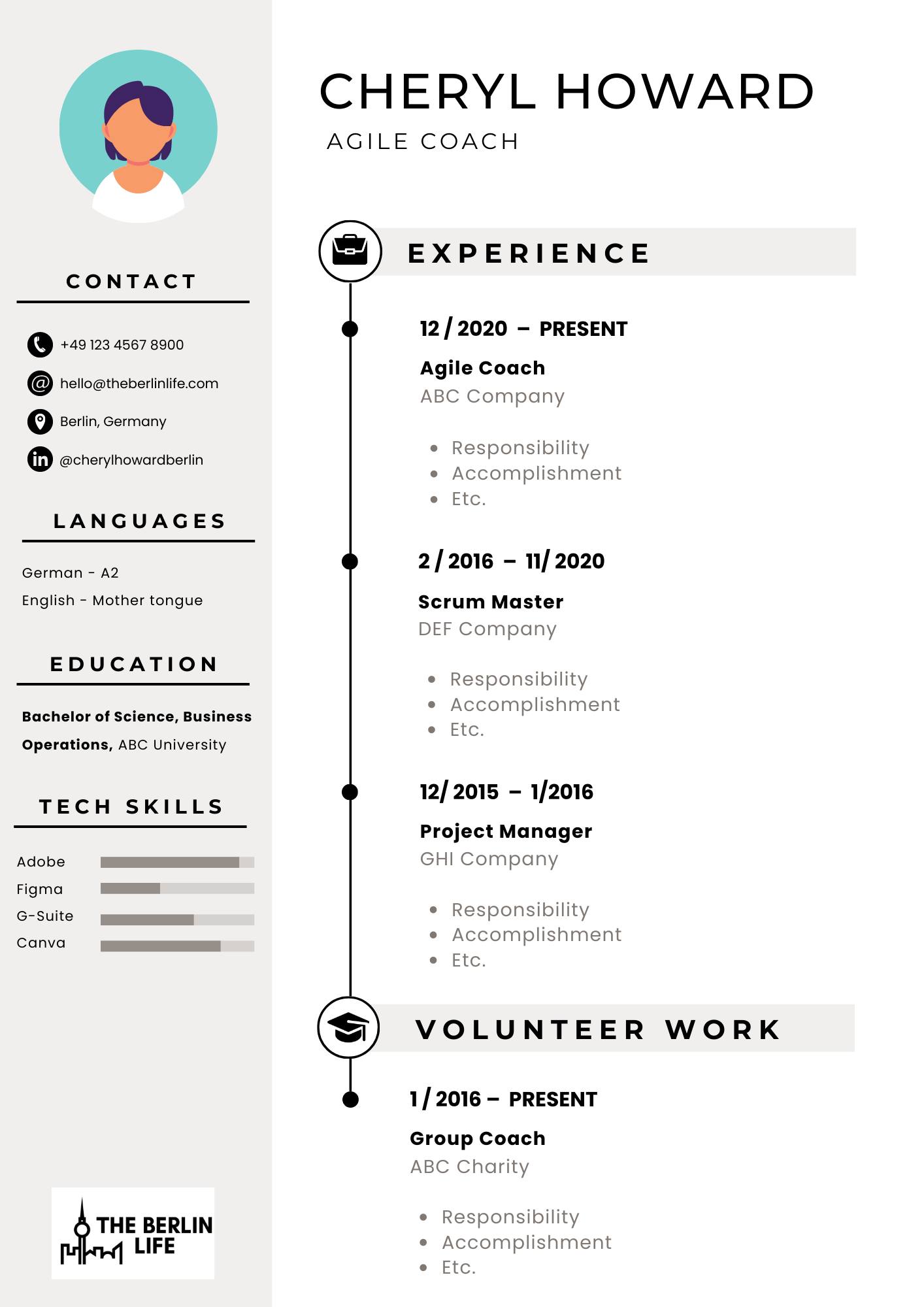HOW TO WRITE A GERMAN CV THAT WILL GET YOU INTERVIEWS
Many foreigners applying for jobs in Germany from abroad or those who are already in Germany looking for work often find themselves not getting any responses to their job applications. This can happen for several reasons, but among them are people being unfamiliar with German CV standards, following outdated practices, getting bad advice from unqualified people, having a poor CV design, and a myriad of other common mistakes.
We’re here to take the mystery out of writing a German CV, teach you how to craft a stand-out CV on your own, and share best practices.
Recommended reading: A Definitive Guide On How To Write A German Cover Letter
Join Our Growing Community
Stay Ahead of the Game: Get the latest news on immigration, job opportunities, and life in Germany delivered straight to your inbox.
Expert Career Advice: Benefit from my 10 years of experience as a career coach & hiring manager.
Insider Tips & Guides: Access 60+ free guides to living and working in Germany.
Community Events & Networking: Join our events to connect with like-minded professionals & build your network in Berlin.
Authentic Stories: Enjoy a personal touch from me with stories, rants, and reflections that make the newsletter informative and enjoyable.
⭐ Can I just say, even though I live in Munich and am not looking for a job – I LOVE your newsletter. Anyone who is a German expat should sign up for it – a lot of value, humanity, and humor in there. - Eleanor, Munich
⭐ Thank you, Cheryl! Always find your newsletters brilliantly written and full of useful tips and insights! 🙏 - Liudmyla, Germany
⭐ Always short and sweet - if you want a sharp update on Berlin life, this newsletter will help you keep up with the latest topics. - Alexandra, Berlin
⭐ Just wanted to pop in and say your page on LinkedIn, as well as the newsletter, are amazing and provide so much value - and relatable stories. - Arunima, Berlin
⭐ Really, on-point, insightful and helpful company, especially through their weekly newsletters, and covering all things, Berlin, Germany, EU and the world. - Rajiv, Berlin
⭐ Great newsletter with info about what is going on in Berlin, what expats should be aware of, and where to look for a job (list of companies that are hiring right now). - Aga, Berlin
More than 10,000 people in Germany are already in. Don’t miss out on the insights, support, and opportunities that The Berlin Life offers. Subscribe now.

LET’S WRITE A GERMAN CV TOGETHER
Our comprehensive German CV guide will take you through creating a German CV step-by-step and following our advice, you’ll be getting interviews with German companies in no time. 🚀
The Difference Between a CV and Resume
What’s the difference between a CV and a resume?
We get this question from our community a lot! For as long as I’ve been in Germany, I thought they were the same thing due to people using both words interchangeably in conversations. However similar, there is a textbook difference according to online sources.
1) CV – A CV (curriculum vitae) is a long-form document spanning multiple pages that presents an exceptionally detailed view of your experience, education, skills, and achievements. These long-form CVs are used more in academia than anywhere else. More common are “CV summaries,” where you condense your CV into a short one or two-page brief. CVs tend to be extremely direct and to the point, using fact-based sentences without an excessive use of adjectives or overtly flowery language.
2) Resume – Resumes, common in places like the United States, are more of a personal marketing brochure intentionally designed to advertise a person’s experience, education, skills, and experience. As these documents are usually heavy on self-promotion, you may observe a higher frequency of buzzwords, longer sentences, and slight exaggerations.
Neither format is better than the other, and in our opinion, a combination of the two is the perfect blend when you’re writing your German CV. You need to convey factual information about yourself while hyping yourself up at the same time. As such, this is the approach we advocate in our CV guide.
How to Format a German CV
One of the first things you need to think about when putting together your German CV is the format:.

As German CVs need not be more than one to two pages, “real estate” is valuable. We recommend using a two-column CV format to optimize the space on your CV. With this format, you can include relevant information without compromising on design.
Another advantage of using this format is that it gets key information into the eyes of the CV reader in one quick glance. And with hiring managers sometimes only looking at job applications for six seconds, you need to do all you can to optimize your chances of getting a job interview.
In the narrow column, you can include any of these CV elements:
1) Contact Information
2) Languages
3) Skills
4) Education
5) Training & Certifications
6) Visa Status
7) Web Site(s)
8) Social Profiles
9) Hobbies
The wider column can then be used for detailing your professional experience and related accomplishments.
The example on the left gives you a rough idea of what your CV could look like.
Design Considerations for German CVs
There are other things that you need to consider when designing a German CV.
1) Use an attractive design that looks professional and something that you took care and time to complete. A German CV should never look like it’s something that was thrown hastily together, as it will seem that you didn’t put much thought or effort into crafting the document. When job hunting, first impressions matter a lot, and a well-designed CV is vital to help create that first positive view of you as a potential employee.
There are numerous CV builders out there and our favorites include:
All of these services are free or budget-friendly. There’s no need to spend much money to create a visually appealing CV.
2) When writing a German CV, you must consider accessibility and how easy your CV is to read. Using the correct font size is essential, as is using an appropriate font.
According to Indeed, these are the best fonts for CVs:
⭐ Arial
⭐ Cambria
⭐ Calibri
⭐ Didot
⭐ Garamond
⭐ Times New Roman
⭐ Helvetica
In terms of font size, use a 10 – 12 size font.
3) You can also add more style and flare to your CV by using upper case, bolding, italicizing, or underlining. Bulleted and numbered lists are also suitable for CVs. Whatever style you choose, be sure to apply it consistently. i.e., If you bold a heading and use a slightly larger font size, do this for all headings.
You may read in some publications that Germans don’t like to see style applied to CVs. It’s an unfortunately false stereotype that I see perpetuated all too often. While content matters, so does having a nice-looking CV.
That said, don’t go overboard on your design to the point where it overpowers your content. The last thing you want is for the reader to miss out on valuable information about you because they find it hard to read.
Be aware that some applicant tracking systems (ATS) can’t read CVs when using tools like Canva. Keep your CV as simple and minimal as possible – don’t include graphics or tables.
The Length of a German CV
How long should your German CV be? German CVs tend to be one to two pages MAXIMUM. Our advice to help keep your CV brief and to the point,
1) Avoid wordy descriptions and the excessive use of adjectives.
2) Don’t repeat the same responsibilities over and over if you’ve held the same role in more than one company. Read more about this topic in the professional experience section, below. 👇 👇 👇
3) Only list relevant certifications, trainings, and conferences, and even then, no more than a handful. It’s quality vs quantity here. If you feel like to want to show employers a more detailed view, link to your website or LinkedIn profile instead. If someone is interested in seeing more, they can do so.
4) If you’ve had a longer career, skip listing what you did at those first jobs and only detail what you did in your more recent (and relevant) positions. You can even omit those first jobs you had, as well as irrelevant jobs.
For example, before I started university I worked at a fast food restaurant, during university as a bartender, and fresh out of school as an administrative assistant. It was only a couple of years into my working life that I established myself as an IT project manager. As that’s since been my main career, I never include any of these first jobs on my current CV.
5) As with cover letters, don’t write a novel and summarize, summarize, summarize.
6) You may read in some publications that CVs spanning multiple pages are acceptable. I don’t believe this to be true, as it will be rare for a recruiter or hiring manager to spend more than a few minutes looking at your CV.
In other words, brevity is your friend here. Detailed information can always be provided or uncovered later on during the recruitment process in interviews, workshops, presentations, and tests. The main purpose of a German CV is to make them interested enough to take you to the next stage which is the first interview.
Have an “About Me” Blurb or Professional Experience Summary on Your CV
An “About Me” blurb is one of the most important elements of your German CV:
Start your CV with a few sentences that tell the world about who you are, professionally speaking. Think of it as a sort of “in the nutshell summary”. This is where you can truly show off your personality. A well-written “About Me” statement can make you stand apart from the crowd and like a cover letter, it acts as a teaser that leaves employers curious to know more.
It should be two to three sentences long and explain what you do for a living, things you’re passionate about, and the value you can deliver to companies.
I work as an Agile Coach, and this is my current “About Me” blurb:
An IT project manager turned enthusiastic Scrum Master and then passionate Agile Coach. A servant leader supporting organizations in their agile journey, guiding departments, teams, and individuals to develop to their fullest potential.
This statement covers my career journey and deep experience (IT project manager to Agile Coach), articulates the value I bring (supporting organizations in their agile journey), and what I love doing as a professional (guiding departments, teams, and individuals to develop to their fullest potential).
Some people will tell you that this CV element is optional, but I strongly disagree. If a recruiter or hiring manager is only going to spend a few seconds looking at your CV, you want to give them a summary and feature it prominently at the top of your CV, compelling them to read it right away and leaving them wanting to know more about you.
Highlighting Your Professional Experience on a German CV
For each place you’ve worked, include:
⭐ Your company name
⭐ Title or role
⭐ Start and end dates
⭐ Responsibilities and/or accomplishments
⭐ What the company does in one or two sentences (optional)
⭐ URL to the company website (optional)
What to consider when listing out your professional experience:
1) Your points should never be a list of common job duties or responsibilities. For example, when I worked as a Scrum Master, one of my responsibilities was to facilitate agile rituals with my team. As this is a universal part of any Scrum Master’s job, you need to build on that more. I could take it further and say:
Facilitated agile rituals with my teams, including regular planning, grooming, and retrospective sessions, continually improving their effectiveness.
The more specific you can be the better, especially if you can qualify it with numbers. As a Scrum Master, you typically work with software engineers to ship new features to the company’s websites, apps, etc. So a Scrum Master could say something like this:
Led a team of 8 engineers to deliver a rebranded company website that resulted in a 25% increase in sales and 1,000 new registered users.
2) It’s not uncommon for people who’ve held the same role at more than one company to repeat the same responsibilities multiple times throughout their CV. For example, a person who works as a team lead usually holds regular “one-on-one” meetings with the people they manage. This person may have been a team lead at three different companies and in such a case, there’s no need to repeat this responsibility three different times. Find a way to convey the points differently or highlight another aspect of your job as a team lead instead.
3) What’s better is finding a way to showcase your responsibilities and accomplishments in a single point. Continuing with the team lead example, you could say something more specific like:
Worked with one of my employees to develop a personal growth roadmap that led to them becoming a team lead within one year.
See how much better that reads? It implies regular meetings with the employee and shows how the team lead worked with that individual to grow into a similar role.
4) Start all of your bullet points with action or power verbs such as led, oversaw, created, developed, etc. Check out this useful list of Synonyms For Common Resume Power Verbs for more inspiration.
Some other things to think about:
⭐ Try not to use the same words too many times.
⭐ Make sure the verbs are in the correct tense. All past jobs should be in the past tense and any current work in the present tense. I see my clients making this mistake A LOT.
Past tense: Authored and maintained technical documents for all feature releases.
Present tense: Author and maintain technical documents for all feature releases.
⭐ Use verbs that convey authority and come across more strongly. Take the following examples:
Weak: Facilitated regular onboarding workshops for all newbies to the company.
Strong: Led regular onboarding workshops for all newbies to the company.
While both of the above sentences are true, using the verb led is more impactful to the reader.
When You Don’t Have So Much Experience
How can you make your German CV stronger when you’re just starting your career?
If you’re fresh out of school or have minimal experience, there are other things you can do to strengthen your German CV. You can highlight:
⭐ Projects you’ve worked on
⭐ Meet-ups you regularly attend or speak at
⭐ Books you’ve read recently
⭐ Conferences you’ve attended or spoken at
⭐ Volunteer work you do or have done
i.e., A newbie software engineer may talk about contributing to open source projects, or a newbie UX designer could talk about some of their design projects completed while in school. It’s ideal if the things you include here are professionally relevant.
Career Gaps in German CVs
What if you have career gaps?
If you have gaps on your CV for any reason, such as taking a sabbatical, going on parental leave, returning to school, or something else, there’s no need to indicate this on your CV. It’s not relevant to whether or not you’re qualified for a job.
Other CV guides may tell you to do this because you run the risk of giving a “bad impression” to your potential employer, but honestly, would you want to work for someone who demands to know why you took a year off and won’t hire you if you don’t divulge that information? It’s frankly none of their business.
People need to take breaks sometimes. In a world where we face increasing levels of uncertainty and an endless barrage of catastrophic global events, we should all be a little more empathetic with one another and not concern ourselves with something as inconsequential as a career gap. Instead, we should concern ourselves with whether or not someone has the capability to do the job at hand.
If you still want to include reasons for career gaps on your CV, Indeed has some great tips about how to approach employment gaps.
Career Changes
How to communicate career changes when you’re writing a German CV.
You shouldn’t be afraid to show prior experience on your German CV, even if it’s not directly relevant to your current profession. Sure, you don’t need to include those part-time jobs you did during university or list out every single job you ever did, but if you have good experiences that can showcase your capabilities, include them. You gained experience in those past jobs, honed new skills, or further improved existing ones. However, it would be ideal if you could word your points to make them relevant to your current career. Doing so will demonstrate how transferrable your experience and skills are to your new career.
Read our guide, Is Changing Employers In Germany A Good Idea?
Optional Elements Of A German CV
These are some optional items you could add to your German CV to make it even stronger:
1) Website – Link to your portfolio or blog, showcasing you and/or your work.
2) Social Profiles – LinkedIn, Github, Twitter, Instagram, etc.
3) Volunteer Work – Anything you do outside of work, whether it’s related to your profession or something more personal.
4) Passion Projects / Side Hustles – Things that are done outside of normal work hours, even if it doesn’t relate to your day job. Take me for example – I’m more than just an agile and team coach. In addition to my day job, I run a travel blog and this site, The Berlin Life. Yes, I never stop working and I have no life. 🙃
5) Hobbies – A list of what you love doing. Maybe you’re an aspiring chef, ardent cyclist, or wine connoisseur. I like putting things like this on my CV, as it feels authentic, relatable, and interesting. I make it a practice to ask candidates about these things in an interview as they’re nice icebreakers.
It’s up to you to decide if you want to include these optional CV elements. Not all companies are that cool or forward-thinking, especially more traditional German companies or industries. I’d recommend checking out the vibe of the company first. You can get an idea by browsing the company website, reading Glassdoor reviews, and observing how they present themselves as an employer on social media, etc.
Recommended reading: Researching German Companies During Your Job Search
Ultimately, the choice is yours. You should include what you think makes you look like your best self, will enhance your overall CV, and most accurately represent you as a person.
Information that You Should NEVER Include on Your German CV
Despite what a lot of German employment guides tell you, there are certain things that you should NEVER include on your CV.
1) Avoid sharing too much personal information – Many will tell you that in Germany, it’s normal and even required to share things like marital status, date of birth, country of birth, as well as how many children you have on your CV.
Traditional companies may still expect this as it previously was the norm, but you don’t need to provide this data. Some German companies (like the one I currently work for) are even asking applicants not to include this information in their job applications.
2) Maybe leave out a photo as well – Photos are yet another unfortunate factor that could add bias during the recruitment process. Use your best judgment and do whatever makes you feel comfortable when adding photos to your CV.
Recommended reading: German CV Photos – Are They Even Necessary?
If you decide to feature a photo on your German CV, keep it professional looking and/or aligned with the general culture of the companies to which you’re applying. Typically, a simple headshot does the trick.
I’d also recommend keeping your photo on the small side and not something that takes up an entire page of your CV. Such a prominent and large photo can come across as a bit much unless you’re applying for a job where such photos are commonplace like an acting or modeling gig.
For even more tips, read our guide about common German CV mistakes.
Customizing German CVs
Many people ask if German CVs need to be customized in the same way as cover letters.
As a general rule of thumb, CVs should always be customized for individual applications and should be tailored to the job description of the role to which you’re applying.
Advantages of doing this?
⭐ Employers want to know how you can help them. Your customization efforts make it quicker and easier for companies to understand why you’re a candidate they should invite to a job interview.
⭐ It demonstrates that you’ve put thought and effort into crafting a standout job application and that you care about delivering high-quality results.
Note, that it doesn’t mean you need to create a brand new CV for each job application, but it does involve making some basic changes. Start by reading over the job description and taking notice of the key things the company is seeking. If something is mentioned more than once, you can consider that an important requirement to focus on and refine your CV accordingly.
1) Professional experience section. You can add certain keywords or phrases that match the job requirements, or re-word it to more closely match the desired candidate profile.
2) Skills section. You likely have a plethora of skills to showcase. Change them up as needed.
3) Experience section. Think about repositioning your job responsibilities or accomplishments.
Above all, be strategic about how many points or words you pull from the job description and add to your CV. Keep the keyword stuffing to a minimum and only do it when it makes sense. Consider using words or phrases that sound similar, while appearing as natural and organic as possible. A keyword on the page may trigger excitement in a hiring manager or increase your chances of being recommended by an ATS, but on the other hand, it can come across as really obvious and make you appear disingenuous. Even worse, it will frustrate your reader, which is the last thing you want to happen when someone is reviewing your CV.
Say you’re applying for a job as an accounts payable specialist and you have about five years of experience. The job description calls for experience with processing employee expense claims and using various ERP systems.
Your current CV might say: Review and process supplier invoices.
You could slightly alter this statement to read: Review and process supplier invoices and employee expensive claims using SAP.
Last but not least, be sure you can back up and prove any claim you make when adjusting your CV. Don’t just add something for the sake of doing so, be sure it’s something you have experience and qualifications.
Writing Your CV In German
Some people recommend writing your CV in German to get noticed by ATS’, as it’s more likely your profile will bubble up to the top of search rankings. Honestly, this might actually work! That said, be careful and use your best judgment. It could backfire if they discover your actual level of German doesn’t match the level of your job application.
At the very least, indicate your language level very clearly and feature it very prominently on your CV.
Recommended reading: Are There English Speaking Jobs In Germany?
Proofreading Your German CV
Run a quality check on your CV by:
⭐ Ensure there are no typos or grammatical errors
⭐ Check that the formatting is consistent
⭐ Ensure there’s a logical flow of information
⭐ See that links don’t lead to broken pages
If possible, have a second or third pair of eyes review your cover letter. It could be a friend or family member or even someone you pay. You can also post in our Facebook group and ask fellow members to take a look and give you feedback.
There are a lot of tools out there offering free CV reviews, like ResumeWorded and Top CV. They can certainly be helpful but I’d advise you not to take all of their recommendations seriously and only follow the ones that make sense and feel right. The reviews are done via an automated process, meaning no human eyes are taking a look at your CV. The recommendations provided often reinforce outdated industry practices, contradict what some of their competitors say, and reflect job application norms of countries outside of Germany.
I ran my CV through some of these tools as a test and advised me not to include an about me statement, as well as hobbies. I disregarded this advice entirely. 🤡
Being Honest on Your CV
Being truthful on your German CV is especially important.
Be honest about your education, work experience, professional accomplishments, and language levels. Exaggerations and lies could come back to haunt you and set false expectations with your potential new employer.
I’ve seen colleagues give themselves promotions on LinkedIn, saying they use the word managers when they never had anyone reporting to them. Another colleague claimed to lead a project that only started after they left.
Berlin may be Germany’s capital city, but the working community is small and people talk and it’s likely the same in other parts of the country. A potential employer may know someone at your former company and reach out to them for information. If this happens and it’s found you misled your potential employer, it could cost you not only the job but your professional reputation.
If you follow our advice, we’re confident that you’ll be hearing from employers in no time, and that you’ll soon find a job in Germany.
RELATED CONTENT
All Funded Startups Hiring in Germany in 2026
Funded startups hiring in Germany right now. See which roles are in demand, what they pay, and where the jobs are. Real insights, updated daily.
Companies in Hamburg Hiring Right Now
Are you looking for a job in Hamburg? Then check out this ever-growing list of companies in Hamburg that are hiring right now.
Companies In Berlin Hiring Right Now
Are you looking for a job in Berlin, Germany? Then check out this ever-growing list of 300+ companies in Berlin that are hiring right now.

Cheryl Howard, Founder @ The Berlin Life
Hi, I’m Cheryl. My mission is to help you move to Berlin and find work.
A Canadian in Berlin for 10+ years, I have the unique experience of moving to Berlin – not once, but twice. During my time in Berlin, I’ve had five different visas and worked as both a freelancer and a permanent employee for numerous Berlin companies. I even managed to find a new job during the pandemic and again in 2023, during Germany’s recession and massive layoffs in tech.
My day job has involved work as a hiring manager, overseeing the recruitment of countless people, as well as a team coach helping teams and individuals work better and find happiness in their careers. Through my side projects, I’ve also shared my personal experiences by publishing a series of helpful blog posts, creating a thriving community of job seekers, and hosting events to help people find work in Berlin. In 2021, I decided to put my coaching and recruiting talents to use by creating The Berlin Life, bringing my existing content and community together in one spot.
The combination of my personal and professional experience means I know exactly what it takes to move to Berlin and find work.






Please I’m a Ghanaian and currently lives in Ghana. I’ve never been to Berlin, Germany. But I really want to relocate to Berlin, Germany to work. Please how do I go about it? Any advice or assistance?
Hi Ernestina, Welcome to our website! As a start, I recommend reading through our guides about moving to Berlin and finding a job in Berlin. Also, definitely join us on Facebook. Then if you have more questions, we can take it from there. 🙂
Hey can u help me write the best CV …and currently am in Germany on a visit visa . could u help me find a job as well
Hi there Sebikali! I can definitely help you write a new CV and cover letter through coaching sessions. Check out our page and make a booking if interested. https://theberlinlife.com/your-berlin-career/career-coaching/
Hi Cheryl,
Would it be possible for you to share the CV template you posted above as a sample, in MS word format?
Thanks & Regards,
Anvesh
Hi Anvesh, The template there is a very simple example, so that’s why it’s just a graphic.
If you use one of our services like CV coaching or a quick review, I then share templates that you can use yourself (in addition to the usual detailed feedback I provide).
Do German companies avoid hiring those over 50? My husband has many years IT experience and wants to work, but we also want to move to Germany. Any advice?
Hey K. Yes, German companies would certainly be open to hiring someone over 50. If he works in an in demand industry and has the required qualifications, including German language skills and related education, finding work is certainly a strong possibility.